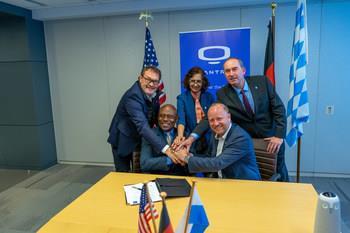US based logistics company TMP Logistics Group has signed a framework agreement with German truck start-up Quantron for an order of up to 500 Class 8 hydrogen fuel-cell vehicles. The contract was signed on 12 October at the Delegation of German Industry and Commerce following the Hydrogen Americas Summit 2022.

The vehicles will be delivered by 2024 and will be operated via Quantron-as-a-Service (QaaS). It is also intended to integrate zero-emission vehicles from third-party suppliers into the QaaS platform and offer zero-emission solutions to customers based on total cost of ownership on a per-mile basis (TCO).
“Bavaria backed the right horse early on with hydrogen,” says Hubert Aiwanger, the Deputy Minister President of the Free State of Bavaria and Bavarian Minister of Economic Affairs. “The decarbonisation of truck transport is a central task in the energy transition. The current energy crisis is calling even louder for solutions without fossil fuels, and the trend toward the use of hydrogen has been accelerated.
”In the US alone, the demand for heavy-duty fuel cell trucks is estimated at up to 300,000 vehicles by 2030. This Bavarian-American framework agreement marks the start of close transatlantic co-operation in the market for climate-neutral mobility. In Europe, too, hydrogen trucks must achieve a breakthrough in the next few years.”
Green hydrogen vehicles for goods transportation have a massive market potential in the United States, says Quantron. By 2030, the total market for electrified and fuel cell-powered Class 8 heavy duty vehicles in the United States is expected to be around 280,000 to 300,000 vehicles. This means that alternative powertrains with hydrogen and all-electric drive have a huge growth potential, from around 2,000 total units per annum today to over 35,000 in 2034.













